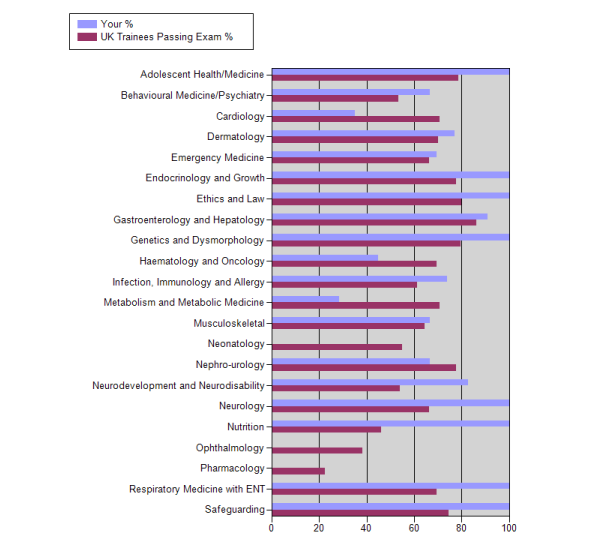
Highlights
“Everyone trusts the work that Mast does, so if they say we have to do something a certain way, then people are happy to work with that. It shows that they have the kind of backing and trust across the team to make change happen..”
Joanne Hatton, Enterprise Systems Manager at RCPCH
Background
The Royal College of Paediatrics and Child Health (RCPCH) is the professional body for paediatricians in the UK. It is responsible for postgraduate training of paediatricians.
To this end, RCPCH manage a series of professional examinations, which are run in examination centres all over the world. There are usually several exam cycles, referred to as ‘diets’ every year. A typical exam sitting will take place in 40-50 venues simultaneously, with over 1,000 exam candidates taking part. Half of the exam venues are in the UK, with the rest spread all over Asia and the Middle East.
The work that Mast did on the the move to automated placement and results is estimated to have saved in the region of £19,000 a year, as well as approximately 10 weeks a year in printing, stuffing and posting exam-related letters.
The Challenge
Prior to the examination taking place, each candidate needs to be sent personalised joining instructions, detailing when and where their examination is taking place. After the exam results are published, each candidate is sent details of their results.
Prior to Mast’s involvement, all this correspondence was done by post. This was very labour intensive and, because a significant number of candidates sit their exams overseas, also a very costly process.
Joanne Hatton, Enterprise Systems Manager at RCPCH, looks after the CARE CRM database and TaskCentre automation system for the college:
“Previously, sending out exam letters and results was a lot of manual work for lots of people. We have to process and send exam admission letters and exam results, for 4 different types of exams, 3 times a year. This basically meant we did a lot of envelope stuffing.”
“The option to move away from that was compelling. To have a basic template, populate that template with examinees information, send those letters out to them and then re-populate that into our CRM database – that was a very attractive proposition.”
Mast were asked to look at automating these processes and moving from post to e-mail as the main method of distribution.
“The most challenging part of the project was how complicated our exams are. Trying to get operational people to agree on a format is very difficult. And on top of that, in the middle of the project, they changed the structure of our exams – we went from 15 different exam centres each with their own different process, to 40-50 different exam centres. If we had tried to do that in a manual way, that would have been much too complicated.”

Approach
Mast used Orbis TaskCentre to automate these processes, with each candidate receiving a personalised e-mail, with a PDF attachment.
In the case of joining instructions, the attachment gives details of the exam location, date/time and any special instructions.
For result letters, Mast were able to significantly improve the level of feedback candidate receive. As well as top level details of their personal performance, such as whether they passed or failed and their pass mark, Mast added graphs showing their performance on each topic area of the exam compared to the average mark of those who passed.
This gives candidates a very good indication of where they should focus if they want to improve their marks in future.
The Impact
The work that Mast did on the the move to automated placement and results is estimated to have saved in the region of £19,000 a year, as well as approximately 10 weeks a year in printing, stuffing and posting exam-related letters.
It now takes users only a few minutes to send joining instructions/results compared to several days previously. If there is a problem with a specific exam centre, these joining instructions /results can be held back, without holding up anything else.
All the details printed on the joining instructions, such as venues, sitting times, links to venue websites, etc. are stored in the standard NG database tables, so can all be maintained by the users without needing any assistance from Mast or their internal database team.
As Joanne explains:
“The dramatic increase in the number of exam centres had a knock on effect that no one noticed or thought about, but we can always rely on Mast to be able to help us to think through and cover the various changes. It’s all well and good building an automation system, but if you can’t maintain that system then it’s not that useful. Mast always make us feel that we’ve bridged the gap between where we are and where we want to get to.”
“Without the support of Mast, it wouldn’t have been easy to move from this manual hands-on process to using an automated technology like TaskCentre. People are set in their ways and are quite fixed in how they think things should work, so it’s difficult to break that.”
“Everyone trusts the work that Mast does, so if they say we have to do something a certain way, then people are happy to work with that. It shows that they have the kind of backing and trust across the team to make change happen.”



